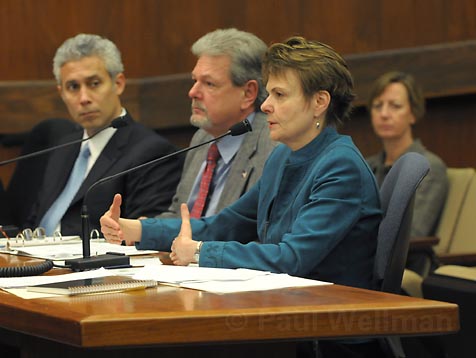Financial Reprieve for County Mental Health
$2.3 Million Handed to Department; Future Funds Uncertain

It came down to 4th District Supervisor Joni Gray. Third District Supervisor Brooks Firestone-repeating his mantra that the county was in bad fiscal shape and a yes vote would be inappropriate-had already indicated he would be voting down any option to bail out Santa Barbara County’s adult Mental Health Services (MHS) department, which was facing an almost $7 million deficit. The other three supervisors had indicated they would support an option to fully eliminate the deficit with money from the county’s General Fund, citing the need to take care of the county’s most vulnerable population and that cuts would lead to layoffs and decreased services to the mentally ill. But Gray took pause. “Oh boy,” she said. “This is a tough one. This is definitely a tragedy.”
The department, which consumes 41 percent -$34.9 million-of funding for the county’s Alcohol, Drug & Mental Health Services (ADMHS) division, has long been beleaguered by mismanagement, and she wasn’t sure letting it off the hook while problems still lingered was the way to go. “These cuts have got to start now,” she said, with a snap of her fingers. “Only because it’s going to get a whole lot worse.” That statement belied her final decision, however, as other supervisors ultimately persuaded her that giving some money was, in fact, the way to go.
More than 30 community members, mental health advocates, consumers, and Community Based Organization (CBO) executive directors spoke in front of the board, telling stories of how any cut would mean a reduction or elimination of services they either receive or give. “We believe the consequences would be dire,” said Annmarie Cameron, executive director of the Mental Health Association. They asked the board to eliminate the problem while they continued to work with new department director Ann Detrick and County CEO Mike Brown’s office in order to fix the department. Meetings are already underway to redesign the department.
And Gray, in a compromise with supervisors Joe Centeno, Janet Wolf, and Salud Carbajal, agreed to it. The compromise means $2.3 million will be poured into the department immediately and, in a month, if the Board of Supervisors is satisfied with a progress report from Detrick on the changes being made for the better of the department, more money will follow. It was a critical move, as each month that goes by without taking care of the deficit means another $570,000 added to it, Brown explained to the board.
For months discussions have emphasized the need to cut money to make up the deficit, which was originally pinned at $2.4 million, but has ballooned most recently to $6.97 million. The shortfall comes mostly as a result of no Medi-Cal revenue or reimbursement from the state, though designations of money for $1.18 million for a North County CARES unit and to support Casa del Mural, a residence for the mentally ill, also contributed.
But those in MHS and those who received money from the department didn’t want to see any services take a mid-fiscal-year hit as a result of the deficit. Dr. Edwin Feliciano, ADMHS interim medical director, warned the board that reduced services from the county would lead to an increased cost in patient care and increased emergency room and crisis service visits, more patients on the street, and more interactions with law enforcement. “It’s our department’s responsibility to provide this service standard to the community,” he said.
Most everyone agreed that this fix was a temporary solution. And with many unknowns lingering about the county budget and a $14.4 billion state deficit, more tough decisions are right around the corner for the department. But for now, everyone can breathe a sigh of relief. “At the end of the day we’re going to be judged by how we treat the citizens we’re here to serve,” Centeno said. “I tend to want to support the human side of the issue.”



